Google eBooks Dropping ABA, Powell's, Others

Effective next January, Google is ending its Google eBooks reseller program with the American Booksellers Association, Powell's Books, Alibris and 13 other parties internationally and aims to focus on selling e-books directly through its Google Play service.
Google, which launched Google eBooks in late 2010, said that the resellers program "has not gained the traction that we hoped it would." The future of Google's affiliate program is unclear.
In a letter to members, ABA CEO Oren Teicher said that although the association is disappointed, "we have every confidence that, long before Google's reseller program is discontinued, ABA will be able to offer IndieCommerce users a new alternative e-book product, or choice of products, that will not only replace Google eBooks as it currently works on IndieCommerce sites but that will be in many ways a better product."
He acknowledged that the nearly 400 indies selling e-books via Google have had "modest" sales. (Some estimate Google's share of the U.S. e-book market way below 1%.) But, he continued, "being able to offer e-books to your customers is an indispensable feature of any bookstore's web offerings, and this capacity has helped drive online traffic that has contributed to increased overall sales. Moreover, we've all learned a lot about selling e-books in the last year and a half, and we're looking forward to the opportunity to offer an improved product."
The ABA is offering a FAQ about the situation with Google.
Powell's has sold e-books for a decade but signed up for Google eBooks in 2010 "to solidify our place in the highly competitive e-book industry," president Emily Powell said. "We believed in good faith that we would be partners with Google far into the future, and we invested in that portion of our business accordingly."
Although Powell's offers e-books from other sources, including Ingram, the change "will leave a gap in the company's digital book offering at a critical time," Powell continued, but Powell's is exploring "opportunities to expand that business in response to the loss."









 In related e-book news, several representatives of the American Booksellers Association met March 19 with staff at the Justice Department "to convey just how important the agency model is for the health of the book industry and a truly competitive marketplace," CEO Oren Teicher wrote to members. "We made very clear to DOJ that we believe the agency model has corrected a distortion in the market fostered by major online retailers, which sought to eliminate competition both on the publishing level and at the distribution level."
In related e-book news, several representatives of the American Booksellers Association met March 19 with staff at the Justice Department "to convey just how important the agency model is for the health of the book industry and a truly competitive marketplace," CEO Oren Teicher wrote to members. "We made very clear to DOJ that we believe the agency model has corrected a distortion in the market fostered by major online retailers, which sought to eliminate competition both on the publishing level and at the distribution level."


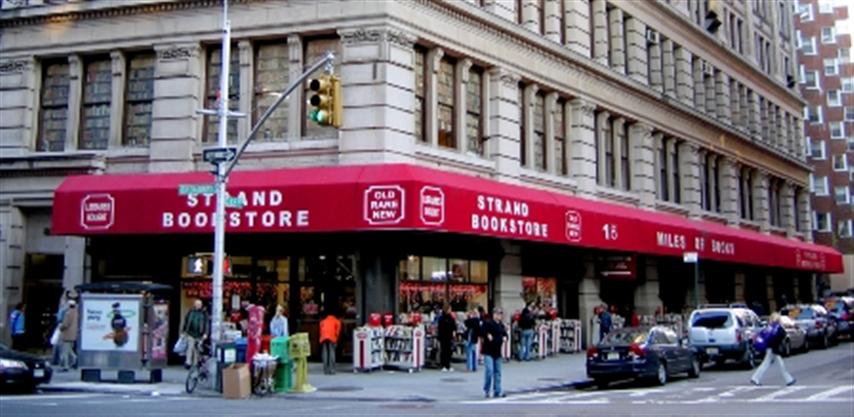 The approximately 140
The approximately 140  The Fredericksburg, Va., City Council will
The Fredericksburg, Va., City Council will  Amazon.com has opened
Amazon.com has opened  "We had budgeted for a much lower figure," Pottermore director Charlie Redmayne told Radio Litopia's The Naked Book show. "I had looked at the physical sales of the books, and tried to anticipate what proportion of sales would be digital, and that there was a certain amount of pent-up demand, but it surpassed anything we anticipated."
"We had budgeted for a much lower figure," Pottermore director Charlie Redmayne told Radio Litopia's The Naked Book show. "I had looked at the physical sales of the books, and tried to anticipate what proportion of sales would be digital, and that there was a certain amount of pent-up demand, but it surpassed anything we anticipated." 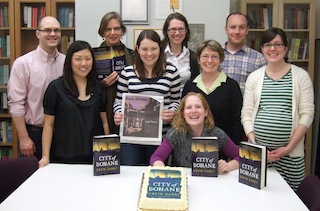
 In
In  The Chicago Tribune offered a tribute to
The Chicago Tribune offered a tribute to  "People flock to [Areti Georgili's new bookstore, Free Thinking Zone] to talk of ideas, of developing new and constructive ways to cope with the economic crisis. They don't waste time shrieking epithets at the Germans or the Turks, or blaming the immigrants who flood the country almost unchecked. These are goads used by cynical men to incite the mob. Instead, at Free Thinking Zone, folks talk about challenging the corrupt bureaucracy and nepotism, to push for meritocracy. The discussions are quite animated, but not frivolous, because what's happening here--and what could happen in America--isn't frivolous."
"People flock to [Areti Georgili's new bookstore, Free Thinking Zone] to talk of ideas, of developing new and constructive ways to cope with the economic crisis. They don't waste time shrieking epithets at the Germans or the Turks, or blaming the immigrants who flood the country almost unchecked. These are goads used by cynical men to incite the mob. Instead, at Free Thinking Zone, folks talk about challenging the corrupt bureaucracy and nepotism, to push for meritocracy. The discussions are quite animated, but not frivolous, because what's happening here--and what could happen in America--isn't frivolous." Another book person in politics:
Another book person in politics: 
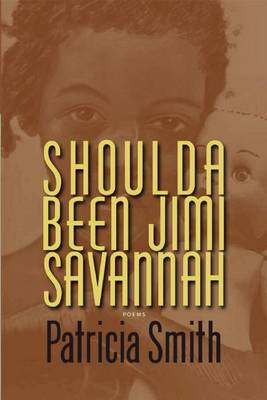 Shoulda Been Jimi Savannah: Poems by Patricia Smith (Coffee House Press, $16 trade paper, 9781566892995, March 27, 2012)
Shoulda Been Jimi Savannah: Poems by Patricia Smith (Coffee House Press, $16 trade paper, 9781566892995, March 27, 2012)
 Book you're an evangelist for:
Book you're an evangelist for: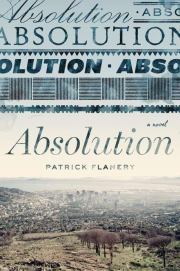 Patrick Flanery's first novel, Absolution, asks a modest familiarity with South Africa's history of racial, ethnic and political strife if we are to appreciate the nuances of paranoia and deception that drive the novel's characters' search for understanding and, ultimately, for redemption. In exchange, this ambitious, multilayered novel rewards the reader with insights into memory and the tricks its plays to carry us over the hurdles of our past mistakes, as Flanery's introspective characters tell forceful stories of family secrets and political intrigue.
Patrick Flanery's first novel, Absolution, asks a modest familiarity with South Africa's history of racial, ethnic and political strife if we are to appreciate the nuances of paranoia and deception that drive the novel's characters' search for understanding and, ultimately, for redemption. In exchange, this ambitious, multilayered novel rewards the reader with insights into memory and the tricks its plays to carry us over the hurdles of our past mistakes, as Flanery's introspective characters tell forceful stories of family secrets and political intrigue.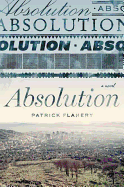
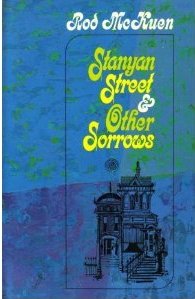 "I don't really remember why I picked up Stanyan Street & Other Sorrows--maybe I had heard him sing--but I was completely captivated," recalled my colleague Marilyn Dahl, book review editor at Shelf Awareness. "The poetry spoke to me viscerally, especially at a time in my life when everything was drama and angst and joy and sorrow--you know, a time when no one understands you except a poet. And now, later in life, these lines still ring true: 'and things that might have been/ if I'd had wiser eyes.' So the first time I went to San Francisco, I walked to Stanyan Street on a pilgrimage. Even now, when I am in SF on the way to my sister-in-law's and cross Stanyan Street, I feel the magic of McKuen's poetry and connection. I want to stop and walk that street again."
"I don't really remember why I picked up Stanyan Street & Other Sorrows--maybe I had heard him sing--but I was completely captivated," recalled my colleague Marilyn Dahl, book review editor at Shelf Awareness. "The poetry spoke to me viscerally, especially at a time in my life when everything was drama and angst and joy and sorrow--you know, a time when no one understands you except a poet. And now, later in life, these lines still ring true: 'and things that might have been/ if I'd had wiser eyes.' So the first time I went to San Francisco, I walked to Stanyan Street on a pilgrimage. Even now, when I am in SF on the way to my sister-in-law's and cross Stanyan Street, I feel the magic of McKuen's poetry and connection. I want to stop and walk that street again." Cheryl Krocker McKeon of Rakestraw Books, Danville, Calif., observed: "Your essay today resonated, as I recall my Ohio State education prof, the quarter I was due to graduate, disagreeing with my interpretation of a poem and saying the fateful words, 'I feel sorry for any student in your class.' I eventually overcame her criticism, but continued to enjoy poetry, including Rod McKuen."
Cheryl Krocker McKeon of Rakestraw Books, Danville, Calif., observed: "Your essay today resonated, as I recall my Ohio State education prof, the quarter I was due to graduate, disagreeing with my interpretation of a poem and saying the fateful words, 'I feel sorry for any student in your class.' I eventually overcame her criticism, but continued to enjoy poetry, including Rod McKuen."